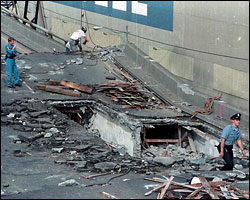
Earthquakes
Be Ready!
 |
Workers sift through a section of I-880 in Oakland, Calif., on Oct. 19, 1989.
� Paul Sakuma/AP Wide World
|
Police, fire fighters, first aid helpers and other emergency workers
are especially busy after a big earthquake. Roads may be damaged, making
travel difficult. It might be difficult for help to reach the scene of
earthquake-related damage or injuries.
For these reasons, anyone who lives in an earthquake-prone area should
be prepared to be on their own, without help, for at least 72 hours. That
means your family should have a well-stocked emergency kit stored in a
safe place:
Be sure your kit contains:
- First aid kit and instruction booklet
- Plastic tarp or a small tent
- Emergency ("space") blankets and one sleeping bag for each
family member
- At least one gallon of bottled water per person, per day. For a 3-day
supply, that adds up to three gallons of water per person
- Enough canned or dried food for 3 days
- Can opener
- Flashlight (easily in reach)
- Battery-powered radio
- Spare batteries for everything (stored separately in waterproof bags)
- Toilet paper, soap, toothpaste and toothbrushes, and other personal
supplies
- Multi-purpose dry chemical (Class ABC) fire extinguisher
- Any important medicine and supplies for infants, elderly people, and
others with special needs
Preparing for an earthquake also means knowing what to do — and
what not to do — after an earthquake stops.
Be sure you:
- Keep calm! You may need your energy to help others less fortunate
than you
- Check yourself and others nearby for injuries
- Give first aid quickly and carefully
- Check your home for any major damage or fires
- Take your emergency supplies with you if you have to leave
|


